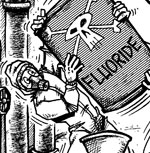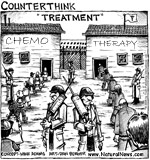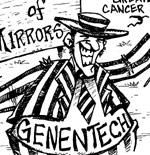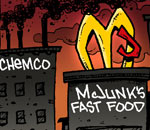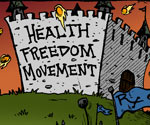The Relationship of Vitamin C and Cancer Depends on the Form of Vitamin C
| Share on Facebook | Share on Twitter | Share on Google+ |
Health experts tell us either that vitamin C is practically a wonder drug for most kinds of cancer, or that vitamin C and cancer have essentially no relationship at all – and both are right. Here is a review of the clearly confusing evidence for using vitamin C as a treatment for cancer.
The Rationale for Vitamin C Cancer Treatment
When people turn to vitamin C therapy for cancer, they have usually exhausted other alternatives. In some cancer patients, vitamin C is exactly what they need to undo the damage of conventional cancer treatment. Here are a few examples.
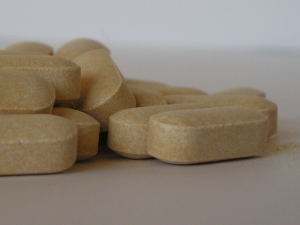
Kidney damage. The kidneys are tremendously stressed by cancer therapy, especially if the cancer treatment works. When cancerous tumors break down, they release enormous quantities of protein that has to be filtered out of the bloodstream by the kidneys. Add to that the fact that the kidneys also have to deal with toxic effects of chemotherapy, and it is hardly a surprise that many cancer survivors have to deal with kidney damage.
Vitamin C is especially useful for helping the kidneys avoid the accumulation of scar tissue. Diabetics who have cancer especially benefit from the kidney protection afforded by appropriate use of vitamin C. (More about the form and dosage of the vitamin best suited to cancer treatment is below.)
Heart damage. Hundreds of thousands of women who have received Adriamycin (doxorubicin) for breast cancer are left with permanent tissue damage in the heart. Some supplements help the heart work better despite the fact that the chemotherapy damage cuts off the flow of oxygen to pockets of heart tissue. Among these are L-carnitine and Co-Q10
Vitamin C helps stabilize heart rhythms. And when the heart beats regularly, it is less likely to throw out blood clots that can cause stroke, pulmonary distress, or kidney failure.
Bone damage. Breast and prostate cancers are notorious for spreading to the bones. Cancer treatment can kill the cancer in the bones, but then it is necessary for the body to rebuild the bone that cancer destroyed. Vitamin C activates the osteoblasts, cells that repair and replace the bone that cancer destroys.
Fighting viral infection. The stress of cancer treatment often reactivates long-dormant viral infections like the kind of herpes that causes chicken pox. The virus that triggers chicken pox in children often triggers shingles in adults over 60. Along with herbal therapies like lemon balm, vitamin C in relatively high doses helps stop the misdirected immune reaction that otherwise can cause weeks and months of painful skin lesions.
These are the most important ways vitamin C can support recovery from cancer. But what about vitamin C as a treatment for active cancer?
IV Vitamin C and Cancer
In the 1970's, Nobel laureate Linus Pauling aggressively promoted the use of vitamin C as a treatment for cancer. What is usually overlooked by the proponents of vitamin C is that Pauling only tried this vitamin therapy in otherwise "hopeless" patients. When late-stage cancer patients were given 1 to 10 grams (1,000 to 10,000 mg) of C a day by intravenous drip, life expectancy was increased by an average of 420%. But the 420% increase was only a life expectancy of 210 days. Still, most "breakthrough" cancer treatments don't offer even that much additional life expectancy.
Cancer treatment actually has advanced since the 1970's and when Canadian doctors studied using intravenous vitamin C in terminal cancer patients, they had some patients go into remission indefinitely. No one, however, has gone into remission from cancer from the use of vitamin C alone.
Here is what you need to know about vitamin C as a primary treatment for any kind of cancer:
- Taking vitamin C by mouth won't help very much. Intravenous vitamin C is needed.
- Vitamin C therapy is most likely to be helpful in bladder cancer, kidney cancer, and lymphoma.
- Vitamin C seems to work by stabilizing the tissue holding cancer cells in place. If you aren't able to eat enough protein for your body to make collagen, you aren't likely to get a lot of benefit from vitamin C.
You just might, however, be the person who goes into remission after taking intravenous vitamin C. Work with your doctor to find the right role for vitamin C in your cancer treatment.
Selected References:
Demirbag R, Yilmaz R, Erel O, et al. The relationship between potency of oxidative stress and severity of dilated cardiomyopathy. Can J Cardiol. 2005 Aug;21(10):851-5.
Frei B, Lawson S. Vitamin C and cancer revisited. Proc Natl Acad Sci U S A. 2008 Aug 12;105(32):11037-8. Epub 2008 Aug 5.
Gaby AR. Natural remedies for Herpes simplex. Altern Med Rev. 2006 Jun;11(2):93-101.
-
Skin CareMen Skin Care
-
Free ResourcesFree eBooks
-
The way you think, the way you behave, the way you eat, can influence your life by 30 to 50 years.Deepak Chopra
-
Featured Health SupplementTotal Balance is like no other
 … in that it utilizes state of the art delivery systems not generally used in a supplement...
… in that it utilizes state of the art delivery systems not generally used in a supplement...
-

